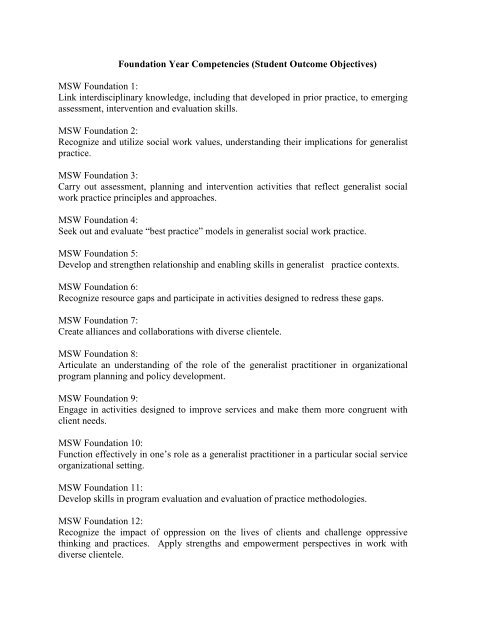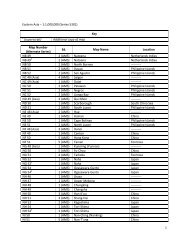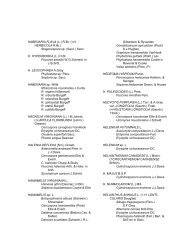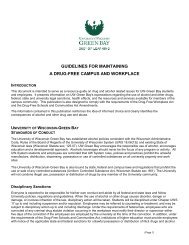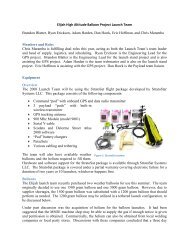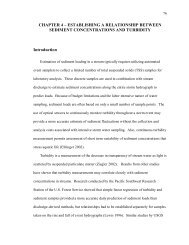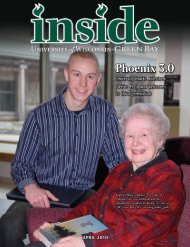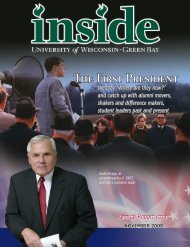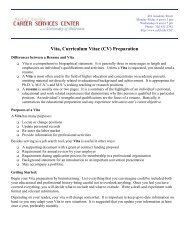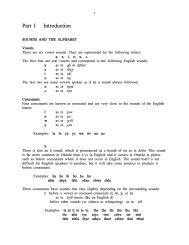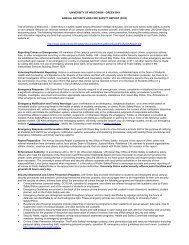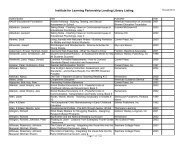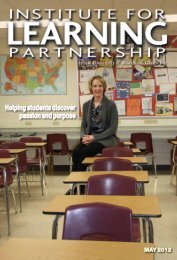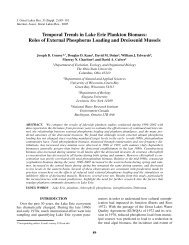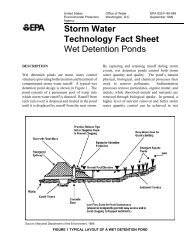MSW Program Competencies
MSW Program Competencies
MSW Program Competencies
You also want an ePaper? Increase the reach of your titles
YUMPU automatically turns print PDFs into web optimized ePapers that Google loves.
Foundation Year <strong>Competencies</strong> (Student Outcome Objectives)<br />
<strong>MSW</strong> Foundation 1:<br />
Link interdisciplinary knowledge, including that developed in prior practice, to emerging<br />
assessment, intervention and evaluation skills.<br />
<strong>MSW</strong> Foundation 2:<br />
Recognize and utilize social work values, understanding their implications for generalist<br />
practice.<br />
<strong>MSW</strong> Foundation 3:<br />
Carry out assessment, planning and intervention activities that reflect generalist social<br />
work practice principles and approaches.<br />
<strong>MSW</strong> Foundation 4:<br />
Seek out and evaluate “best practice” models in generalist social work practice.<br />
<strong>MSW</strong> Foundation 5:<br />
Develop and strengthen relationship and enabling skills in generalist practice contexts.<br />
<strong>MSW</strong> Foundation 6:<br />
Recognize resource gaps and participate in activities designed to redress these gaps.<br />
<strong>MSW</strong> Foundation 7:<br />
Create alliances and collaborations with diverse clientele.<br />
<strong>MSW</strong> Foundation 8:<br />
Articulate an understanding of the role of the generalist practitioner in organizational<br />
program planning and policy development.<br />
<strong>MSW</strong> Foundation 9:<br />
Engage in activities designed to improve services and make them more congruent with<br />
client needs.<br />
<strong>MSW</strong> Foundation 10:<br />
Function effectively in one’s role as a generalist practitioner in a particular social service<br />
organizational setting.<br />
<strong>MSW</strong> Foundation 11:<br />
Develop skills in program evaluation and evaluation of practice methodologies.<br />
<strong>MSW</strong> Foundation 12:<br />
Recognize the impact of oppression on the lives of clients and challenge oppressive<br />
thinking and practices. Apply strengths and empowerment perspectives in work with<br />
diverse clientele.
<strong>MSW</strong> Foundation 13:<br />
Understand the elements of ethical professional practice and recognize and evaluate<br />
ethical dilemmas in practice.<br />
<strong>MSW</strong> Foundation 14:<br />
Use peer and supervisory support effectively in an effort to improve one’s practice.
Revised Advanced Year Competences (Student Outcome Objectives)<br />
10/30/07<br />
<strong>MSW</strong> Advanced 1:<br />
Applies an interdisciplinary orientation in the systematic change process (e.g., intake and<br />
assessment, plan development; interventions; evaluation and reassessment; and/or termination)<br />
with multi-level systems.<br />
<strong>MSW</strong> Advanced 2:<br />
Utilizes the strengths perspective and a capacity-building approach in the systematic change<br />
process with multi-level systems.<br />
<strong>MSW</strong> Advanced 3:<br />
Competently employs interventions that reflect principles and methodologies consistent<br />
with social work practice in community-based, family-focused settings, particularly those<br />
that reflect practice from an empowerment and strengths-based perspective. The <strong>MSW</strong><br />
student appropriately applies such interventions relative to his/her practice methodology<br />
(Administration/Management or Advanced Direct Practice). Students apply a three-step<br />
process:<br />
a. Student researches and assesses best-practice interventions using an empowerment<br />
and strengths perspective framework.<br />
b. Student integrates best-practice interventions into the community-based agency<br />
setting using an empowerment and strengths perspective framework.<br />
c. Student evaluates impact of best-practice interventions within the communitybased<br />
agency structure using an empowerment and strengths perspective<br />
framework.<br />
<strong>MSW</strong> Advanced 4:<br />
Provides leadership by conducting empirical research activities designed to shape more effective<br />
public/tribal family intervention practices and provide supporting data for policy changes that<br />
enhance family well-being. These activities may include qualitative or quantitative<br />
methodologies directed at needs assessment, process or summative program evaluation activities,<br />
surveys, or analyzing existing data.<br />
<strong>MSW</strong> Advanced 5:<br />
Demonstrates leadership in both collaborative and team building activities.<br />
<strong>MSW</strong> Advanced 6:<br />
Demonstrates an understanding of resource gaps and effectively utilizes current<br />
resources, encourages resource enhancement, and/or develops new resources.<br />
<strong>MSW</strong> Advanced 7:<br />
Demonstrates cultural competency in the systematic change process (e.g., intake and assessment,<br />
plan development; interventions; evaluation and reassessment; and/or termination) with multilevel<br />
systems.
<strong>MSW</strong> Advanced 8:<br />
Articulates a vision for his/her leadership role in public/tribal organizational program planning<br />
and policy development informed by and grounded in organizational theory, policy analysis<br />
models, and leadership theory.<br />
<strong>MSW</strong> Advanced 9:<br />
Articulates program and social policy change methods directed at improving conditions for<br />
children and families that are based on social work theory and informed by the specialized needs<br />
of rural and local communities.<br />
<strong>MSW</strong> Advanced 10:<br />
Demonstrates knowledge of the Field Placement agency mission, goals and objectives,<br />
and critically assesses the congruence of the mission and goals with ethical social work<br />
principles of practice. <strong>MSW</strong> students engage in activities that support Field Placement<br />
agency goals and ethical practice.<br />
<strong>MSW</strong> Advanced 11:<br />
Demonstrates an ongoing commitment to improving individual professional practice with and on<br />
behalf of client systems through systematic and sustained evaluation of practice using multiple<br />
methods including, seeking and effectively using feedback, continuous personal reflection and<br />
assessment, and effectively integrating new learning to increase efficacy in needed areas.<br />
<strong>MSW</strong> Advanced 12:<br />
Effectively uses social work roles with vulnerable and oppressed client systems.<br />
<strong>MSW</strong> Advanced 13:<br />
Possesses a working knowledge of the elements of ethical professional social work<br />
practice and uses this knowledge to successfully resolve ethical dilemmas in practice.<br />
<strong>MSW</strong> Advanced 14:<br />
Demonstrates leadership and professionalism in practice, including contributing to the<br />
professional growth and development of colleagues.<br />
Advanced Field Seminar <strong>Competencies</strong>:<br />
A. Understands and responds to an array of important issues with a specific<br />
client system using a systematic, multi-level, change process and<br />
intervention approach (e.g. completion of the case presentation<br />
assignment).<br />
B. Effectively process records a client contact that demonstrates application<br />
of theory to practice (e.g. completion of the process recording<br />
assignment, or the Integrating Theory into Your Agency Practice<br />
assignment).


